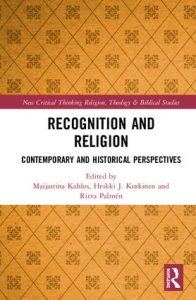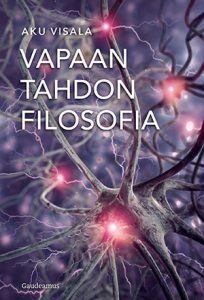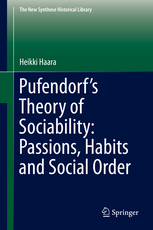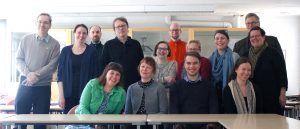An interdisciplinary conference in December 16–18, 2019, Helsinki, organised by the CoE in Reason and Religious Recognition and funded by the Academy of Finland and University of Helsinki
Venue: The House of Sciences and Letters (Tieteiden talo), Kirkkokatu 6
The aim of the conference is to examine how medieval and early modern Christian, Jewish and Muslim thinkers (in theology, philosophy, history, and law) accommodate figures of otherness in their work, either as parts of specific theological, philosophical, legal and political arguments or as tangible beings that have to be reckoned with. Theoretical and methodological approaches are welcome, and interdisciplinary perspectives are encouraged.
Main themes include:
- Toleration and recognition (cultural, ethnic, religious)
- Identity (formation of the self and the group)
- Rights, needs and liberties
- Virtues; common and individual good
These themes call for several questions, such as the identification of the group in terms of who and what are to be recognized, and why; as well as interrogating and interpreting the moral bases of the question of otherness together with rights, responsibilities or virtues. Naturally, this also raises historical investigations of events and institutions in this vein, including crusades, missionary work, slavery, the Inquisition, colonialism, and others.
KEYNOTES:
Professor of Philosophy, University of Columbia
Professor of Philosophy, Ludwig-Maximilian-University, Munich
Professor of History, University of Eastern Finland
PRELIMINARY PROGRAMME
MONDAY 16 DEC.
9.30 Registration (hall 104)
9.50 Opening words, Virpi Mäkinen (hall 104)
10.00–11.00 KEYNOTE (hall 104):
Isabelle Mandrella Encountering Others in Medieval Ethics: The Case of Thomas Aquinas
11.00–11.30 COFFEE BREAK (hall 504)
11.30–13.00 SESSION 1 (hall 505)
Ritva Palmén (Helsinki Collegium for Advanced Studies): Hope, Shame and Self-evaluation in Thomas Aquinas’s Moral Philosophy
Nicolas Faucher (University of Helsinki): Scientia, fidesor opinio? Aquinas on the Epistemic Status of Heretical and Demonic Belief
Juhana Toivanen (University of Jyväskylä/University of Gothenburg): Conditions for a Conceptual Distinction between Common and Individual Good
13.00–14.00 LUNCH BREAK
14.00–15.00 SESSION 2 (hall 505)
Samuel Fernandés (Pontificia Universidad Católica de Chile): Origen’s Doctrine on the Pre-existence of the Soul: A Speculation about Prehistory or a Biblical Enquiry about Our Present Identity?
Virpi Mäkinen (University of Helsinki): Domingo de Soto on the Duties of Public Power in Relation to the Rights of Foreign Poor
15.00–15.30 COFFEE BREAK (hall 404)
15.30–17.00 SESSION 3 (hall 404)
Reima Välimäki (University of Turku): The Worst of All Heresies: Polemical Responses to Waldensianism ca. 1200–1400
Michael Dunne (University of Maynooth): Conflicts, Controversies and Confrontations: The Irish, the Armenians and the Muslims in the Thought of Richard FitzRalph (1300-1360)
Stefan Schröder (University of Helsinki): “O what a strange unnatural fast, fit only for carnal and beastly men!” The Interrelation between the ‘Other’ and the ‘Self’ in Late Medieval Travel Reports to the Holy Land
18.00–20.00 RECEPTION, Faculty of Theology, Faculty Hall (Vuorikatu 3, 5thfloor)
TUESDAY 17 DEC.
10.00–11.00 KEYNOTE (hall 104)
Frederick Neuhouser, Rousseau on the Nature and Source of Social Inequality
11.00–11.30 COFFEE BREAK (hall 504)
11.30–13.30 SESSION 4 (hall 505)
Tim Stuart-Buttle(University of York) and Heikki Haara (University of Helsinki): Recognition and the Acknowledgement of Equality: from Hobbes to Smith
Kaisa Iso-Herttua (University of Helsinki): The Conflict between Religious Identity and Political Order – Lockean Solution
Risto Saarinen (University of Helsinki): Farewell to Early Modern Accounts: Recognition in Schleiermacher’s On Religion (1799)
13.30–14.30 LUNCH BREAK
14.30–16.00 SESSION 5 (hall 505)
Emanuele Lacca (University of South Bohemia, Czech Republic): Justice, Dignity and the Care of the Others in Pedro de Ledesma (1544-1616)
Ryan Manley(Texas A&M University): A Friend Within: Montaigne on Friendship and Conscience
Vili Lähteenmäki(University of Helsinki): Anthony Collins on Powers and Selves
16.00–16.30 Coffee break (hall 504)
16.30–18.00 SESSION 6 (hall 505)
Mikko Posti (University of Helsinki): Medieval Christian Encounters with Pagan Views of Divine Causality
Susan Gottlöber (University of Maynooth): How Tolerable is Cusa’s Tolerance? Revisiting Cusa’s Encounter with Islam
Panu-Matti Pöykkö(University of Helsinki): Some Help from Two Medieval Friends: Levinas, Maimonides and Judah Halevi on Idolatry
18.30–23.00 CONFERENCE DINNER (Unioninkatu 33)
Music: Nelli Saarikoski (vocals/piano), Mikko Posti (guitar), Kimmo Vainio (bass)
WEDNESDAY 18 DEC.
10.00–11.00 KEYNOTE (hall 104)
Jukka Korpela: Does the Law Need Reason and Recognition? Cases from Eastern Church and Politics
11.00–11.30 COFFEE BREAK (hall 504)
11.30–13.00 SESSION 7 (hall 505)
Joanna Comes (University of Porto): Translating Religious Differences: An Impossibility?
Päivi Räisänen-Schröder (University of Helsinki): Encountering Reformation Others in Early Modern German Administration
Joonas Tammela (University of Jyväskylä): The Limits of the “New Israel”? The Collective Lutheran Identities and the Recognition of “the Others” in Swedish Local Sermons, 1790–1820
13.00–14.00 LUNCH BUFFEE (hall 504)
14.00–15.00 SESSION 8 (hall 505)
Patricia Calváro (University of Porto): The Contribute of the Palamite Controversy (14thc.) for the Formation of the Hesychast Identity
Jukka Ruokanen (University of Jyväskylä): Dimensions of Tolerations in the Political Theory of Johannes Althusius
15.00–15.15 CLOSING WORDS, Virpi Mäkinen (hall 505)







